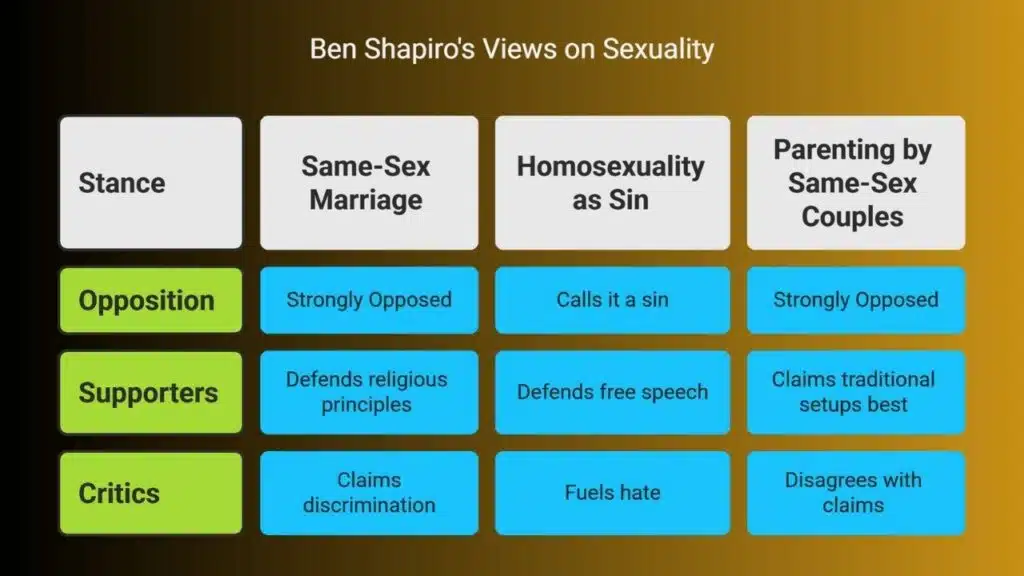Curious minds often ask, “Is Ben Shapiro gay?” This question has sparked debates and endless online chatter. Some rumors stem from his comments on LGBTQ+ topics, while others arise from internet jokes or memes.
The fact is, Ben Shapiro is married to Mor Toledano and has four children. He also follows Orthodox Judaism, which shapes his views on gender roles and marriage.
This blog will explore where these rumors started, why they persist, and what’s really behind them. Stay tuned for the truth!
Key Takeaways
- Ben Shapiro is married to Mor Toledano and has four children. He follows Orthodox Judaism, which shapes his views on marriage and gender roles.
- Rumors about Shapiro’s sexuality mostly come from jokes, satire, or misquotes spread online through memes and viral posts.
- Shapiro opposes same-sex marriage based on his religious beliefs, calling homosexuality a sin according to Orthodox Jewish law.
- Social media plays a big role in fueling rumors by twisting quotes and spreading false claims without fact-checking.
- Reliable sources like Snopes have debunked these claims, confirming they are misunderstandings or satire taken seriously.
The Origins of the Controversy
Rumors about Ben Shapiro’s sexuality took off online like wildfire. Social media users pointed fingers, twisting his words and actions into a bigger story.
Statements by Ben Shapiro on LGBTQ+ topics
Ben Shapiro has consistently opposed same-sex marriage. He argues it goes against traditional values and religious beliefs. He calls homosexuality a sin based on his Orthodox Jewish faith.
On transgender issues, he claims being transgender is a psychological disorder.
He also criticized California laws pushing LGBTQ+ education in schools, calling them harmful to kids. In 2020, he slammed Elliot Page’s coming-out announcement for promoting what he views as “untruths” about gender identity.
His statements often spark heated debates online and beyond.
Social media speculation and its impact
Social media spreads rumors quickly. Viral memes and posts fueled claims about Shapiro’s sexuality. Satirical content played a big role, confusing many people online. Some took jokes as facts, making the rumors seem real.
Confirmation bias added to the fire. Critics of Shapiro shared posts without checking them first. Platforms like Twitter amplified debates, often turning harsh or abusive. Speculation grew louder, even with no proof backing it up.
Ben Shapiro’s Public Views on Sexuality
Ben Shapiro has often shared his disagreements with gay marriage. His comments on parenting by same-sex couples sparked heated arguments online.
Opposition to same-sex marriage
Shapiro has spoken strongly against same-sex marriage. He opposed the Supreme Court’s 2015 ruling in *Obergefell v. Hodges*, which made gay marriage legal nationwide. He argued that the decision undermined traditional family values and redefined the meaning of marriage.
His arguments align with his Orthodox Jewish beliefs, which view marriage as a union between a man and a woman. Critics claim his stance discriminates against same-sex couples, while supporters see it as defending religious principles.
Comments on homosexuality as a sin
Ben Shapiro has called homosexuality a sin based on Orthodox Jewish beliefs. He ties his stance to religious texts, stating that same-sex relationships go against Jewish law. His views reflect traditional teachings rather than modern interpretations.
He openly opposes same-sex marriage and promotes traditional family structures. Critics argue this fuels hate, while supporters claim he defends free speech and faith-based values.
These comments spark heated debates online, especially among LGBTQ+ advocates.
Stance on parenting by same-sex couples
Shapiro has strongly opposed parenting by same-sex couples. He claims kids need both a mother and father for proper development. Critics disagree, citing research showing children of same-sex parents thrive just as well or better than those with heterosexual parents.
He argues traditional family setups are best for society. Studies from major institutions, though, do not support these claims. Researchers have found no negative impact on kids raised by gay or lesbian parents compared to others.
This data challenges his position but remains ignored in his arguments.
Analyzing the Claims About Ben Shapiro’s Sexuality
Some claims come from jokes or satire, which people took seriously. Others twisted his words, creating wild rumors out of thin air.
Misinterpretations of public statements
Ben Shapiro’s opposition to same-sex marriage often leads to confusion online. Critics pull his statements out of context, fueling rumors and arguments. For example, his views on traditional marriage reflect his Orthodox Jewish beliefs, not personal identity.
Satirical posts and memes on social media spread falsehoods further. Many take jokes as facts or twist words from “The Ben Shapiro Show.” These distortions spark debates but rarely focus on truth.
Satirical content and its role in the rumors
Misinterpreting public statements often fuels rumors. Satirical content adds gasoline to the fire. Many jokes and memes on platforms like Twitter and Reddit twist facts into absurd claims.
Viral posts made for laughs sometimes get taken seriously by viewers who miss the joke.
For example, social media floods with parodies mocking Ben Shapiro’s views on same-sex marriage or LGBTQ+ topics. Some users may spread these as truth, either by mistake or for attention.
This blurs the line between humor and misinformation, making it hard to separate fact from fiction online.
Quotes taken out of context
Sometimes, quotes from Ben Shapiro on homosexuality are shared without full context. For example, his comments labeling homosexuality as a sin reflect Orthodox Jewish beliefs, not personal attacks.
Critics often use these statements to paint him unfairly.
Social media amplifies this issue. Platforms like Twitter and Facebook spread clipped videos or phrases rapidly. This fuels misunderstandings about his stance on LGBTQ+ topics. Context matters but is often lost in viral posts and memes.
Social Media’s Role in Spreading Speculation
Rumors spread like wildfire online, fueled by memes and heated debates—let’s dig deeper to find the truth.
Viral posts and memes related to Ben Shapiro
Social media exploded with memes about Ben Shapiro. Many poke fun at his fast-talking debates and strong opinions on same-sex marriage. Some posts falsely imply he’s gay, using satire to stir the pot.
These viral jokes often twist real events or quotes. For example, edited videos exaggerate his reactions during heated discussions on The Daily Wire. Social media made these clips spread like wildfire, keeping speculation alive.
His critics and fans alike share these memes widely. They fuel online arguments but rarely add clarity to debates over his views or personal life.
Next: Confirmation bias in online debates
Confirmation bias in online debates
People often stick to what they already think in online debates. This is called confirmation bias. It happens when someone only listens to ideas that match their opinions. For example, fans of Ben Shapiro may defend his views no matter what.
Critics might twist his words to fit their arguments instead of looking at the full story.
This bias spreads rumors quickly. Memes and viral posts fan the flames without fact-checking. Speculation about big topics like same-sex marriage or LGBTQ+ rights grows because people want proof for their beliefs, not truth.
These heated talks fuel tension and lead to more division, which ties into public reactions later on.
Ben Shapiro’s Religious and Political Beliefs
Ben Shapiro’s Orthodox Judaism shapes his stance on issues like same-sex marriage and homosexuality, offering insight into why his views spark such fierce debates.
Orthodox Jewish views on homosexuality
Orthodox Judaism teaches that homosexuality is a sin. This view comes from traditional Jewish law, which forbids same-sex relationships and sexual activity. These teachings are based on texts in the Torah, such as Leviticus 18:22, which describes such acts as sinful.
Religious leaders often stress a separation between actions and feelings. While they see homosexual acts as wrong, many say having same-sex attraction is not sinful by itself. Still, these beliefs have caused debates within modern Jewish communities.
Some argue for compassion toward LGBTQ+ individuals while sticking to religious laws.
How his faith informs his public opinions
Ben Shapiro follows Orthodox Judaism. This shapes his beliefs about LGBTQ+ issues, including same-sex marriage. His faith sees homosexuality as a sin, based on religious texts and traditions.
He often links his stance to biblical teachings and Jewish law.
Shapiro argues that same-sex marriage goes against traditional family values. He believes parenting works best with one man and one woman. These views tie closely to his religion, not just politics or personal bias.
Public Reactions to the Controversy
People reacted strongly, with heated debates sparking online and communities split over his comments—read on to see why this topic still fuels such lively discussions.
Supporters defending Shapiro’s stance
Many supporters praise Ben Shapiro for his strong defense of free speech. They argue that he has a right to share his views without fear of being silenced. His fans often highlight that free speech is a cornerstone of democracy, even when opinions differ.
Some also back him due to his Orthodox Jewish beliefs. They say his views on same-sex marriage and LGBTQ+ issues align with his faith. Supporters see him as someone standing firm in the face of criticism, which they admire.
Many believe public debates need voices like Shapiro’s for balance and diversity.
Critics highlighting his controversial comments
Some critics call out Ben Shapiro’s views on same-sex marriage. He has openly opposed it, saying marriage should only be between a man and a woman. His stance upset LGBTQ+ advocates who fight for equality.
Shapiro also faced backlash for calling homosexuality a sin based on his Orthodox Jewish beliefs. Many found these comments offensive and discriminatory. Critics argue that his words can spread harm or reinforce hate against LGBTQ+ individuals.
LGBTQ+ advocates addressing misinformation
Critics often amplify false claims, spreading bias online. LGBTQ+ advocates fight this by correcting lies and educating others. Groups like the Southern Poverty Law Center highlight the harm caused by such misinformation.
False stories can lead to hate crimes or discrimination against LGBTQ people.
These advocates stress facts over rumors. They share real data about violence, including high rates of attacks on gay individuals in America. By debunking myths and fostering awareness, they hope to reduce fear and build respect for all orientations.
The Broader Implications of the Rumors
Speculation like this blurs fact and fiction, creating confusion. It highlights how quickly jokes or claims can spiral into misinformation online.
Media responsibility in handling public figures’ personal lives
Media outlets must handle public figures’ private lives with care. Sharing inaccurate or exaggerated stories can ignite rumors and damage reputations. The discussion surrounding Ben Shapiro’s sexuality highlights this issue.
Social media memes and jokes often blur lines between satire and truth, causing real-world repercussions.
Misinformation spreads quickly when platforms fail to verify claims. Irresponsible reporting intensifies debates rather than resolving them. This behavior affects the person involved as well as their family, work, and supporters.
Ethical journalism involves respecting boundaries while addressing relevant topics truthfully.
The intersection of satire and misinformation
Satire can blur the truth. Posts mocking public figures, like Ben Shapiro, often spark rumors. People may take jokes as facts and spread them. In 2023, satire about Shapiro’s sexuality fueled false claims online.
Social media adds fuel to these fires. Memes or tweets go viral, making it hard to spot parody from reality. Users share content quickly without checking its source. This confusion helps misinformation grow fast.
Fact-Checking and Debunking the Rumors
Rumors often spread like wildfire, fueled by jokes or misquotes. It is vital to separate truth from gossip through reliable sources.
Reliable sources clarifying misconceptions
Some claims about Ben Shapiro’s sexuality came from satire or out-of-context quotes. Reliable sources confirm these are false and based on misunderstandings. His public identity aligns with his faith and own statements.
Satirical memes often spread confusion online. Fact-checks by platforms like Snopes debunked the rumors, showing them as jokes or misinterpretations. Public beliefs should not mix with false personal narratives.
Distinguishing between personal beliefs and personal identity
Some confuse what a person believes with who they are. Ben Shapiro’s strong views on same-sex marriage and LGBTQ+ topics often fuel this mix-up. Critics may label him based on his public words, but beliefs don’t always show personal identity.
Shapiro holds Orthodox Jewish values, which guide many of his statements. These religious beliefs shape his stances but don’t define every part of him as an individual. Misunderstanding this can lead to false claims about identity or intent.
Personal views expressed in debates or media don’t reveal private truths fully.
Why the Controversy Persists
The debate keeps raging because Shapiro is such a divisive figure. Social media adds fuel, spreading rumors like wildfire.
Polarization of political and cultural discussions
Political and cultural talks feel divided these days. Ben Shapiro’s strong opinions often add fuel to the fire. His views, like opposing same-sex marriage, spark heated arguments online and offline.
People pick sides fast, creating big gaps in understanding.
Social media makes it worse. Viral memes or posts spread quickly but often twist facts or mock others. This adds noise instead of clarity. Discussions now seem less about listening and more about winning fights over beliefs or identities.
Shapiro’s polarizing public presence
Ben Shapiro attracts strong opinions wherever he goes. As a frequent speaker at college events, his talks often require heavy security due to protests. Topics like same-sex marriage and transgender issues spark heated debates online and in person.
His blunt style and views divide people sharply. Supporters praise him for promoting free speech on platforms like The Daily Wire. Critics accuse him of spreading harmful rhetoric against LGBTQ+ rights.
This sharp divide continues fueling controversies tied to his name.
Takeaways
People love to speculate, especially online. Rumors about Ben Shapiro’s sexuality show how easily gossip spreads. He has shared strong views on marriage and LGBTQ+ issues, but that doesn’t prove anything personal about him.
The truth? He is married with kids and follows his faith closely. This debate says more about internet culture than it does about Shapiro himself.
For more insights on Ben Shapiro, including where he calls home, explore our detailed article here.
FAQs
1. Is Ben Shapiro gay?
No, Ben Shapiro is not gay. He has openly supported traditional marriage and often discusses his views on same-sex marriage in public debates.
2. What are Ben Shapiro’s views on same-sex marriage?
Ben Shapiro opposes same-sex marriage due to his religious beliefs and constitutional conservatism. He frequently shares these opinions through platforms like *The Daily Wire*.
3. Has Ben Shapiro written about LGBTQ+ topics?
Yes, he has discussed LGBTQ+ issues in books like *Porn Generation: How Social Liberalism Is Corrupting Our Future*. He also addresses related topics during debates and interviews.
4. Does Ben Shapiro support free speech for the LGBTQ+ community?
Shapiro supports free speech for everyone, including LGBTQ+ individuals, though he often critiques what he calls “leftist culture” regarding hate crimes or silencing opposing views.
5. Why do some people question Ben Shapiro’s sexual orientation?
Some speculate based on his strong focus on social issues like same-sex weddings or homosexual activity in debates and writings such as *Facts Don’t Care About Your Feelings*, but this speculation lacks evidence.
6. How does religion influence Ben Shapiro’s stance on homosexuality?
As an Orthodox Jew, his faith shapes his opposition to homosexual activity and support for traditional values while engaging with controversial subjects like marriage equality or Roe v. Wade rulings.



































